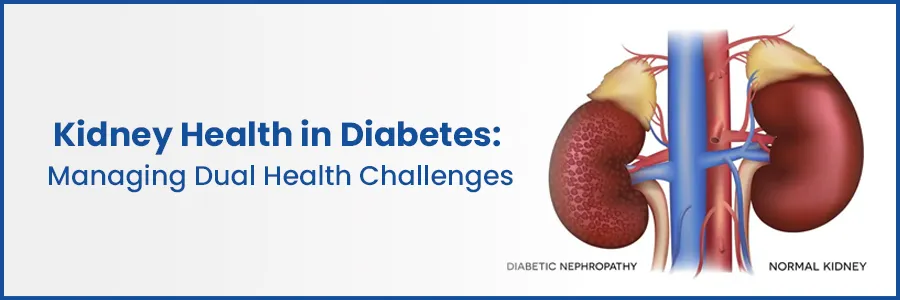Kidney Health in Diabetes: Managing Dual Health Challenges
Diabetes and kidney health are closely intertwined. High blood sugar levels over time can damage the blood vessels in the kidneys, impairing their ability to filter waste effectively.
Managing both diabetes and kidney health is crucial for overall well-being, as complications in either condition can significantly impact one's quality of life.
Understanding Diabetes and Kidney Disease
Diabetes and its Impact on Kidneys
Diabetes is a chronic condition that affects how your body processes blood sugar (glucose). There are three primary types of diabetes:
- Type 1 Diabetes: An autoimmune condition where the body attacks insulin-producing cells in the pancreas.
- Type 2 Diabetes: A condition characterized by insulin resistance and impaired insulin production.
- Gestational Diabetes: Diabetes that develops during pregnancy and usually disappears after childbirth but increases the risk of developing Type 2 diabetes later.
High blood sugar levels from diabetes can lead to diabetic nephropathy, where the kidneys' filtering units become damaged. Over time, this can result in kidney disease.
Get a second opinion from trusted experts and makeconfident, informed decisions.
Get Second Opinion
Types and Stages of Kidney Disease
Kidney disease progresses through different stages:
- Stage 1: Kidney function is mildly reduced, but no symptoms are usually present.
- Stage 2: Kidney function is moderately reduced; some symptoms may start to appear.
- Stage 3: Kidney function is significantly reduced, leading to noticeable symptoms and complications.
- Stage 4: Severe reduction in kidney function; symptoms become more severe, and kidney function is significantly impaired.
- Stage 5: End-stage renal disease (ESRD) or kidney failure; the kidneys can no longer function adequately, often requiring dialysis or a kidney transplant.
Symptoms of kidney disease can include swelling, fatigue, and changes in urination patterns. Complications can range from anemia to bone disease and cardiovascular problems.
Risk Factors and Prevention
Risk Factors for Kidney Disease in Diabetes
Several factors increase the risk of developing kidney complications in people with diabetes:
- Poor Blood Sugar Control: Consistently high blood sugar levels can accelerate kidney damage.
- High Blood Pressure: Elevated blood pressure can worsen kidney damage.
- Genetics: A family history of kidney disease may increase risk.
- Duration of Diabetes: The longer a person has diabetes, the higher the risk of kidney damage.
Regular screenings are essential for early detection of kidney damage, which can lead to timely intervention and management.
Preventive Measures
To reduce the risk of kidney disease, individuals with diabetes should focus on the following preventive measures:
- Blood Sugar Control: Maintain optimal blood sugar levels through diet, exercise, and medication.
- Blood Pressure Management: Keep blood pressure within a healthy range, as high blood pressure can exacerbate kidney damage.
- Healthy Lifestyle Choices: Adopt a balanced diet, exercise regularly, and avoid smoking and excessive alcohol consumption.
Foods to Avoid with Kidney Disease and Diabetes
Avoid high-sodium foods like processed meats and canned soups. Limit potassium rich foods such as bananas, oranges, tomatoes, and potatoes. Avoid sugary foods and beverages like candies, cakes, and sweetened drinks. Focus on a balanced diet low in sodium, potassium, and sugar, including fruits, vegetables, lean proteins, whole grains, and healthy fats.
Kidney Care for Diabetic Patients
Lifestyle Modifications
Maintaining a kidney-friendly diet is essential. This typically involves:
- Low Sodium: To help manage blood pressure and reduce fluid retention.
- Low Phosphorus: Important for individuals with impaired kidney function to prevent mineral imbalances.
- Low Potassium: To avoid dangerous levels in the blood, which can occur with kidney dysfunction.
Staying hydrated is also crucial, but controlling protein intake is equally important to lessen the strain on the kidneys.
Exercise and Physical Activity
Exercise offers significant benefits for both diabetes and kidney health:
- Improved Blood Sugar Control: Exercise helps insulin work more efficiently, lowering blood sugar levels.
- Cardiovascular Health: Reduces the risk of heart disease, common in individuals with diabetes and kidney disease.
- Weight Management: Helps maintain a healthy weight, which is beneficial for overall health.
Suitable types of physical activity for individuals with kidney disease may include low-impact exercises like walking, swimming, and cycling, which are gentle on the joints and cardiovascular system.
Navigating Challenges and Mental Well-being
Coping with Dual Health Challenges
Managing both diabetes and chronic kidney disease can be emotionally challenging. It's important to address:
- Emotional Well-being: Coping with the stress of managing chronic conditions.
- Support Systems: Building a support network of family, friends, and healthcare professionals.
- Positive Outlook: Focusing on achievable goals and celebrating successes, no matter how small.
Engaging with Healthcare Professionals
Building a multidisciplinary healthcare team is crucial for comprehensive care. Effective communication with doctors, dietitians, and other specialists ensures:
- Optimal Treatment Plans: Coordinating efforts to manage both diabetes and kidney disease.
- Tailored Diet Plans: Ensuring diets are appropriate for managing blood sugar levels and kidney health simultaneously.
Conclusion
Monitor health regularly, manage medications, adopt a kidney-friendly diet, exercise, and prioritize both diabetes and kidney health. Stay informed and proactive for a healthier life.


